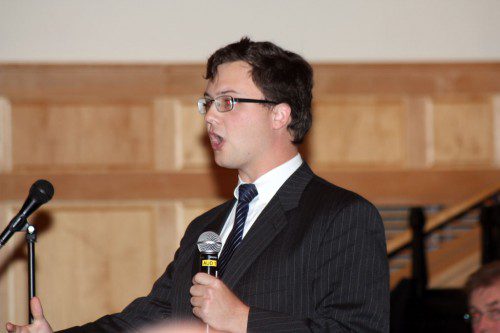By MAUREEN DOHERTY

MICHAEL WALSH explains the basis behind his citizens’ petition proposal to make changes to the Town Charter that would eliminate the Town Administrator position by reverting back to an Executive Assistant role in place prior to 1993. The proposal failed. (Maureen Doherty Photo)
LYNNFIELD — Voters at October Town Meeting Monday night rejected three citizens’ petitions and a fourth was indefinitely postponed without debate.
Articles 5, 6 and 7 were citizens’ petitions proposed by local attorney Michael Walsh.
Article 5 would have abolished the Town Administrator form of government, returning the town to the Executive Assistant form of government that was in place prior to 1993. After an extensive discussion, it failed on a voice vote.
Article 6, a measure to establish a residency requirement for the town’s top nine department heads within one month of date of hire, was not discussed as Walsh requested an indefinite postponement.
Article 7 would have reinstated a five-member Consolidated Personnel Board as it existed in 1983. This volunteer board would oversee everything from creating job descriptions to designing compensation packages and handling grievance procedures, thereby removing those duties from the oversight of either a Town Administrator or, had Article 5 passed, an Executive Assistant.
This article also generated much discussion, but ultimately failed on a voice vote.
The Board of Selectmen, School Committee and Finance Committee each did not recommend passage of either Article 5 or 7. For the selectmen, the vote was 2-1; for the School Committee and FinCom, the votes to oppose were unanimous.
Article 8 was a citizens’ petition proposed by Bob Casoli, 1 Sparhawk Drive and others who sought to close the public way at the road’s intersection with Walnut Street for public safety purposes due to constant cut-through traffic and unsafe U-turns.
These conditions have persisted, the residents say, despite the addition of signs prohibiting U-turns at all times, signs prohibiting thru-traffic during peak morning and evening commutes, and an increased police presence to enforce both while also stepping up increased enforcement of the truck prohibition on this stretch of Walnut Street.
After impassioned pleas from both Casoli and Frank Delisle, 2 Sparhawk Dr. to try the temporary changes, such as the addition of jersey barriers, a hand-counted vote of 107-68 was passed to end the debate and the voters turned down the proposal on another hand count of 98-60.
Article 5
Article 5 generated the most discussion. Walsh provided handouts to the voters summarizing his objectives under Articles 5 and 7. He explained that there are two ways to amend a town charter and his proposal, via a petition to the state Legislature, would be “the simpler of the two versions.”
Walsh said the 1993 change the town made to the Town Charter to shift from an executive assistant to an town administrator form of government “started this slow, gradual shifting of power among our town government. Our town Boards of Selectmen over the years have found it easier and easier to give decision-making power to a paid professional to make the best decisions for us.”
Though he said this shift was “perfectly natural” he objected to the change made by the current Board of Selectmen to adopt a Code of Conduct last year. “Unfortunately, the Code of Conduct says that our Board of Selectmen cannot receive complaints from us. All complaints have to go directly to Town Hall. Literally our representatives …cannot listen to us anymore,” Walsh said.
Walsh sought the charter change to “rebalance the power” in town government. “It is no slight to Mr. Gustus or to Mr. Maney. They have done very capable jobs for us. But it is designed to restore our 1971 charter that was studied very carefully by a Charter Commission. After 18 months it was voted by a ballot box and a full public hearing. When it was changed in ’93 it did not get that full public hearing.”
“In the 1970s and ’80 and early ’90s, department heads regularly made reports to our selectmen, out in public and in view of the press,” Walsh said, adding, “It is a simple maxim of government that anytime a decision is made by an appointed public official it’s not in the public eye as opposed to a public board, which when it makes decisions we get to see how it works.”
Walsh added that although the role of professional management has grown in the last 30 years “and it has its place, that place should be alongside our elected officials, not making decisions for them.”
Selectmen Chairman Dave Nelson objected to the characterization of the Code of Conduct policy by Walsh. “Our Code of Conduct does not prevent anyone from making complaints or bringing issues to the Board of Selectmen. What it does do is ask us to use a little common sense and protocol and work through our town administrator, who by our charter is deemed to do the day-to-day operations of our town,” Nelson said. “The selectmen are in the driver’s seat, believe me. We have authority and we have power, and as a board we are very strong. As one individual going out and doing things on our own, that’s not the way it should work because it also sends mixed messages.”
Nelson also cited the town’s improved bond rating from AA to AA+ by Standard and Poor’s as further proof of the confidence placed in the town’s strong fiscal management policies under a “strong town government” in which all facets work in conjunction with one another, from the Town Administrator and the department heads to the elected and appointed boards “who have applied good, common sense, cost-effective measures.”
He gave credit to the residents and voters “who are dedicated parents and so effectively look out for our kids and the education of their future,” he said.
“Any other form of government such as the passage of Article 5 would only serve to turn Lynnfield backwards. It would weaken our fiscal strength, it would weaken our public school district, it would weaken the morale of our employees and it would prevent top-qualified applicant pools from coming into this town. And it would bring undetermined personal gains and political agendas to those who are trying to run this town and this will prove to be severely detrimental over the next several years,” said Nelson.
Nelson urged voters to vote against it. “We need to maintain one central point of day-to-day control as our charter lays out with a Town Administrator,” Nelson said. “It includes a current Board of Selectmen, who are the executive branch of the town, and a Town Administrator who has the day-to-day operational authority. What we do not need is three to four different officials bringing conflicting agendas which will only send mixed messages and derail any progress to move forward. Lynnfield has everything in place to make this a smooth transition of one town administrator to another and any other way would be total mayhem for this town.”
Patricia Campbell of Patrice Lane praised Walsh for getting involved in town government at a young age. “As an educator and an active member of Town Meeting, I think it is wonderful that the young people of our town are giving such thought to the structure in how we run the town,” Campbell said. “I rejected strongly at the Selectmen’s meeting when one of the selectmen said it was insulting. It’s not insulting. I think it’s fabulous. I think it also points out that we desperately need a charter commission to review the charter. I was here in 1993. I don’t remember a charter change. It certainly needs a review since it was written in 1971.”
Campbell said she agreed with Walsh that the town currently has a town administrator who “is making too many decisions and we have a weakened Board of Selectmen who are not taking the power that the original charter wanted to distribute among the selectmen.”
Town Administrator Bill Gustus said Article 5 as proposed would result in the “law of unintended consequences” because it seeks to repeal two pieces of special legislation from 1993 which “allows the Board of Selectmen to appoint an individual as Director of Finance and Administrative Services and it gives the selectmen the power to appoint someone to do the financial affairs of the town. If you repeal this special act it goes back to the old charter” which gives that responsibility to the Town Clerk.
“I love the Town Clerk, but when I told her this evening that she may end up as the Finance Director, she was a bit appalled,” Gustus said.
“The premise that the Town Administrator has too much power is overblown,” Gustus added. “At least 10 selectmen were elected during my 12 years here. I understand how charter works…I did not last 12 years here by usurping their authority.”
Former selectman Harry LeCours, who served on the board that appointed Gustus from a field of about 55 candidates and voted for his original appointment 12 years ago, voiced his opposition to Article 5.
When Gustus was hired, LeCours said that he was “assigned some additional responsibilities because of his strong background in union negotiations.” LeCours said Gustus was “very adept” at those skills, which will be “sorely missed.” He added, “Going back to an executive assistant is a step going backwards and I feel the Town Administrator and Board of Selectmen should continue as the form of government.”
Article 7
Walsh said he designed Article 7 to reinstate the 1983 version of the personnel bylaw to take effect Jan. 15, 2015, if it passed. He acknowledged that as written it has a “bunch of holes” with respect to more current personnel laws but felt that it could be adjusted easily to include modern laws such as the Family Medical Leave Act (FMLA), which did not exist in 1983.
Walsh stressed that this change would not remove any employee rights or contractual concessions, which are guaranteed by state law.
His main goal was to re-establish the five-member volunteer board of town residents to “supervise employment issues and negotiate with unions” because he believes it would bring more neutrality and transparency to the process when decisions are made in an open public meeting. Final union negotiations would still be done in private per state law. Walsh noted that when he was seeking signatures for his petitions he met four town employees “who refused to sign because they feared retribution. I don’t think their fears were reasonable, but they had them.”
Having a board that reports directly to Town Meeting on pay schedules and employee classification tables was also cited as a means of ensuring more transparency.
Selectman Phil Crawford said he had Article 7 reviewed by the legal team at the Secretary of State’s office. Crawford “strongly discouraged” passage of the article because the work environments has changed so extensively in the past 30 years that it would need significant revisions.
Gustus said he did not want to “presuppose we cannot find able people” to serve on such a committee, but he noted that contract negotiations are “very time consuming” and such a board would need to meet “once per month for 10 months of the year.” The town has seven unions and every three years when the contracts were up for renewal he noted that he met with union representatives “several times per month for seven months.”
Gustus said when he came to town he invited the Personnel Board to attend negotiation sessions but the members eventually felt that “it proved to be quite a burden and after several sessions the board members said ‘You are doing a good job, just give us the report.'”
Currently, there is one member on the Personnel Board, Gustus said, adding, “We have been looking for members for quite some time.”
Joseph Ternullo of 1377 Main St. said he served on the Personnel Board and believes things should remain the way they are currently designed with the Town Administrator conducting the negotiations.
Jack Adelson concurred. “I was on the Personnel Board prior to Joe (Ternullo) and Chris (Barrett) under the old system. There were five of us. One had private sector experience but none had collective bargaining experience. We were totally dependent on labor counsel and cost the town a lot of money. It is no way to run a business. Who owns a business and brings in unpaid volunteers to run it? It was very uncomfortable sitting across the table from professional negotiators. I would not wish that on anyone.”
After the motion failed on a voice vote, Selectman Tom Terranova thanked Walsh for “taking the time to put these three articles forward.”




